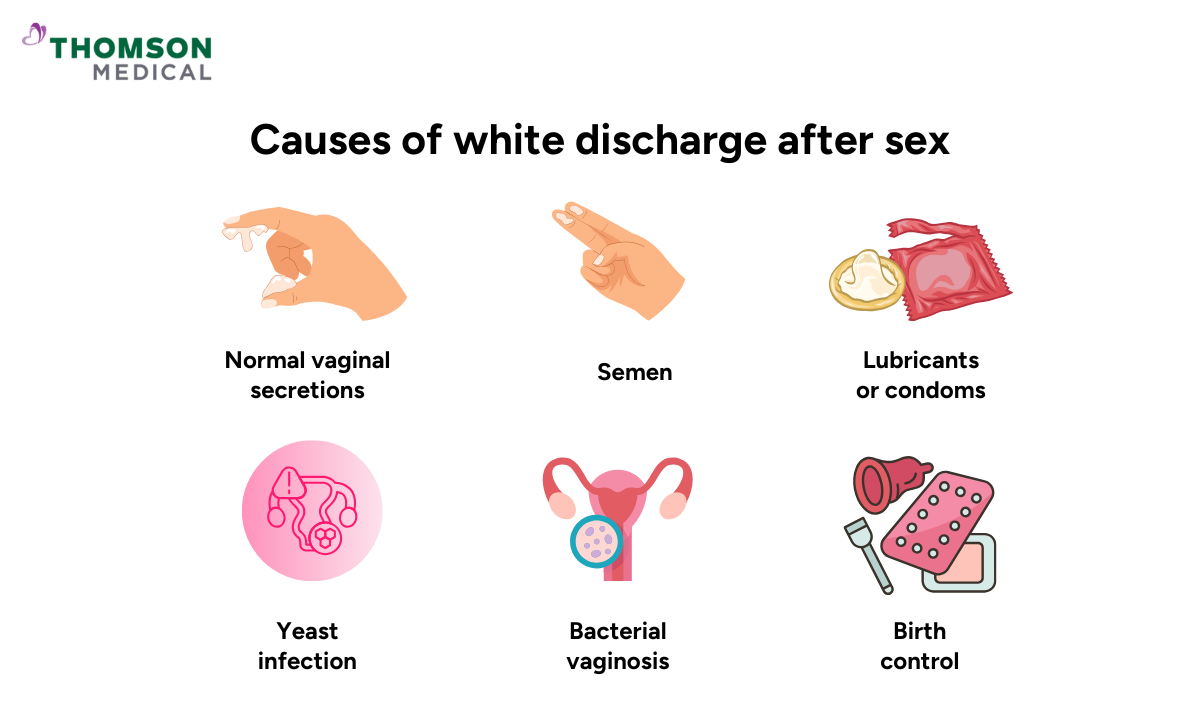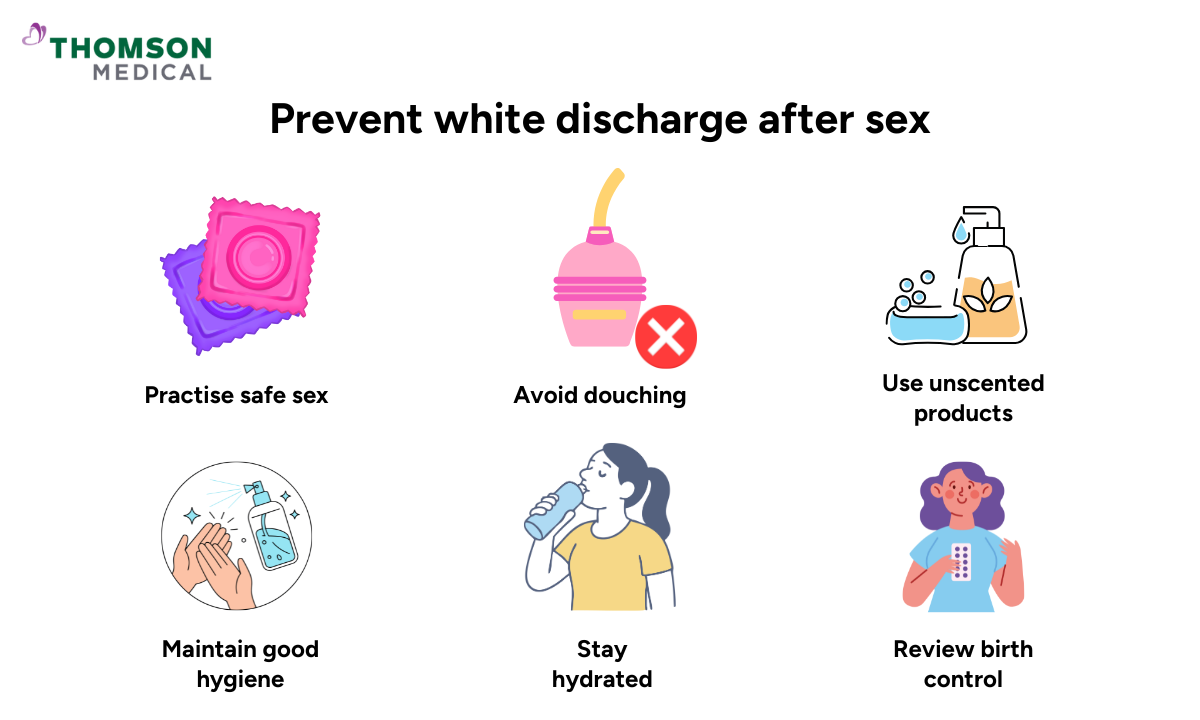For many women, white discharge can appear immediately or a few hours later, which can spark questions about whether it’s normal or a sign of something more serious. The truth is that white discharge after sex is often a healthy bodily response – a mixture of vaginal secretions, natural lubrication, and, sometimes, semen. However, in certain cases, it can also indicate an underlying issue, such as a yeast infection or bacterial imbalance.
What does white discharge after sex mean?
White discharge after sex is quite common and can have several causes, most of which are perfectly normal. It often occurs as a result of natural vaginal lubrication, a mixture of semen and cervical mucus, or the use of lubricants during sex. However, in some instances, it may signal an underlying issue, such as a yeast infection or bacterial imbalance.
To determine whether your discharge is healthy or a cause for concern, pay close attention to its colour, texture, odour and any accompanying symptoms. These clues can help you determine whether it is simply your body's natural response or whether it requires medical attention.
Characteristics of normal white discharge
Understanding the characteristics of your discharge can help you to tell the difference between what is normal and what may indicate an infection. Here’s a simple comparison:
Feature | Normal discharge | Possible infection |
Colour | Clear to white | White, yellow, green, or grey |
Texture | Watery or creamy | Thick, clumpy, or frothy |
Smell | Mild or no odour | Strong, fishy, or unpleasant |
Symptoms | No irritation | Vaginal itching, burning, swelling, or redness |
Timing | Common around ovulation, after sex, or during pregnancy | Can occur at any time and may persist |
Monitoring these features can help you to better understand your body's signals and identify when it might be time to seek medical advice.
Common causes of white discharge after sex

White discharge after sex can have several causes, some of which are completely normal and others of which require medical attention. Knowing these causes can help you to determine whether your vaginal discharge is part of your body's natural cycle or a sign of an underlying condition.
Normal vaginal secretions:
During sexual arousal, the vagina naturally produces lubrication.
A white, milky, or creamy discharge is common, particularly around ovulation or just before your period.
Semen:
After unprotected sex, semen can mix with vaginal fluids and later leak out, often appearing as a thick white or off-white discharge.
This is completely normal and typically resolves within a few hours.
Lubricants or condoms:
Some artificial lubricants or latex condoms can blend with natural vaginal secretions, resulting in a temporary white discharge.
If irritation occurs, consider switching to hypoallergenic or water-based options.
Yeast infection (candidiasis):
Yeast infection produces a thick, clumpy discharge that resembles cottage cheese.
Common symptoms include itching, redness, and vaginal irritation, though there is usually no strong odour.
Bacterial vaginosis (BV):
Bacterial vaginosis causes a white or greyish vaginal discharge often accompanied by a fishy smell, especially after sex.
This imbalance of vaginal bacteria may need treatment with prescribed medication.
Sexually transmitted infections (STIs):
Infections like chlamydia or gonorrhoea can lead to abnormal discharge, usually yellow or green-tinted rather than white.
Other symptoms may include pain, odour, or pelvic discomfort.
Pregnancy or birth control:
Hormonal changes during early pregnancy or the use of hormonal birth control pills, patches, or intrauterine devices (IUDs) can increase or thicken white discharge.
Contraceptive pills are generally harmless and a result of hormonal fluctuations affecting cervical mucus.
When should you see a doctor about white discharge?
While white discharge after sex is often harmless, certain changes can indicate an infection or another underlying condition that requires medical attention. You should see a doctor or gynaecologist if you experience any of the following:
Strong or unusual vaginal odour, especially a fishy smell
Itching, burning, or irritation around the vagina or vulva
Thick, clumpy discharge resembling cottage cheese
Unexpected bleeding or spotting between periods
Fever, pelvic, or lower abdominal pain
If any of these symptoms persist, it’s best to request an appointment with our gynaecology specialists. Early diagnosis and treatment can help prevent complications and restore a healthy vaginal balance.
Our sexual health specialists
Loading...
How is white discharge diagnosed?
If your white discharge appears unusual or is accompanied by discomfort, your doctor will perform a few simple tests to identify the cause. Diagnosis usually involves:
Reviewing your medical history and symptoms to understand patterns, recent sexual activity, or product use.
Pelvic examination to check for signs of irritation, infection, or inflammation.
Vaginal swabs to test for:
Yeast infections (candidiasis)
Sexually transmitted infections such as chlamydia or gonorrhoea
Bacterial vaginosis
Urine test, which may be done to rule out urinary tract infections (UTIs) or STIs.
Vaginal pH test, as an imbalanced pH level can indicate bacterial vaginosis or another infection.
These diagnostic steps help your healthcare provider determine the exact cause and recommend the most effective treatment for your symptoms.
Treatment options for white discharge after sex
The right treatment for white discharge after sex depends on its underlying cause. In many cases, no treatment is needed, but if an infection is present, medical care is essential.
If it’s normal:
No treatment is required. Maintaining good hygiene, wearing breathable cotton underwear, and avoiding harsh soaps can help keep your vaginal balance healthy.
If caused by an infection:
Yeast infection (candidiasis):
Treated with antifungal creams, vaginal pessaries, or oral medication such as fluconazole.
Bacterial vaginosis:
Managed with antibiotics like metronidazole (taken orally or as a vaginal gel).
STIs:
Treated with specific antibiotics, depending on the type of infection (e.g., chlamydia or gonorrhoea).
If your discharge appears unusual or is accompanied by discomfort, schedule a consultation with our gynaecology specialists.
How to prevent white discharge after sex?

Although white discharge after sex is usually normal, adopting a few simple habits can help to maintain a healthy vaginal balance and reduce the risk of irritation or infection:
Practise safe intercourse:
Use condoms to reduce the risk of contracting STIs and to maintain vaginal health.
Avoid douching:
Douching can upset the natural balance of bacteria and yeast in the vagina, leading to infections.
Use unscented products:
Steer clear of scented soaps, wipes, or bubble baths that may cause irritation or allergic reactions.
Maintain good hygiene:
Gently wash the external genital area daily with mild, unscented soap and water. Avoid inserting products inside the vagina.
Stay hydrated:
Drinking enough water supports natural lubrication and overall vaginal comfort.
Review your birth control:
If your hormonal contraceptive causes excessive discharge or irritation, speak to your doctor about alternative options.
Consistently following these preventive steps can help keep your vaginal environment balanced and reduce episodes of abnormal discharge after sex.
FAQ
Is white discharge after sex normal?
Yes, it often is. In many cases, white discharge after sex is perfectly normal. The vagina naturally produces discharge to keep itself lubricated and maintain a healthy pH balance. After intercourse, this discharge can mix with semen, resulting in a thicker, more noticeable white fluid.
Normal post-sex discharge is typically:
White or clear
Odourless or mildly musky
Not itchy or painful
More noticeable after unprotected sex or during ovulation
Can semen be mistaken for white discharge?
Yes. Following unprotected intercourse, semen can leak out and mix with vaginal fluids, resulting in a white or off-white discharge. This is perfectly normal and should stop within a few hours.
How can I tell if my white discharge is from a yeast infection?
A yeast infection (candida fungus) usually causes:
Thick, clumpy discharge (similar to cottage cheese)
Itching or burning around the vagina
Redness and swelling of the vulva
If you’re unsure, it’s best to see a doctor for a vaginal swab or test to confirm the diagnosis.
Can birth control or pregnancy cause more white discharge?
Yes. Hormonal changes from birth control or early pregnancy can increase cervical mucus production, leading to more noticeable white discharge. This is generally harmless unless accompanied by irritation or odour.
Does white discharge after sex differ in men and women?
Yes, the causes are different:
In women, discharge may come from the vagina due to lubrication, ovulation, infections, or semen leakage.
In men, white discharge after sex is typically semen. However, abnormal discharge unrelated to ejaculation may signal an STI or urinary infection, which requires medical evaluation.
Should my partner also be treated if I have a yeast infection?
Not always. If your partner has symptoms such as itching, redness, or irritation, they should be examined and possibly treated. In cases of recurrent infections, both partners may need treatment to prevent reinfection.
Does white discharge affect fertility?
Normal discharge supports fertility by helping sperm travel through the cervix to reach the egg. However, infections that cause abnormal discharge – such as chlamydia or gonorrhoea – can negatively impact fertility if left untreated.
The information provided is intended for general guidance only and should not be considered medical advice. For personalised recommendations based on your medical conditions, request an appointment with Thomson Medical.
For more information, contact us:
Thomson Specialists (Women's Health)
Thomson Women's Clinic (TWC)
- Novena:
6592 6686 (Call), 8611 8986 (WA) - Bukit Batok:
6569 0668 (Call), 8686 3525 (WA) - Choa Chu Kang:
6893 1227 (Call), 8282 1796 (WA) - Jurong:
6262 8588 (Call), 6262 8588 (WA) - Katong (female doctor):
6970 2272 (Call), 8611 9020 (WA) - Punggol:
6243 6843 (Call), 8811 0328 (WA) - Sembawang: 6753 5228
- Sengkang: 6388 8125
- Serangoon (female doctor): 6382 3313
- Tampines: 6857 6266
- Tiong Bahru: 6276 1525
Notice
The range of services may vary between TWC/TS locations. Please contact your preferred branch directly to enquire about the current availability.
Request an Appointment